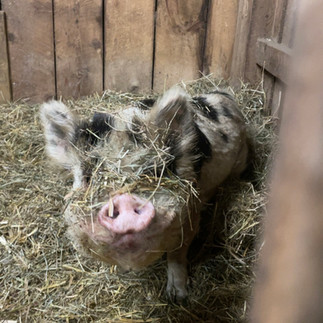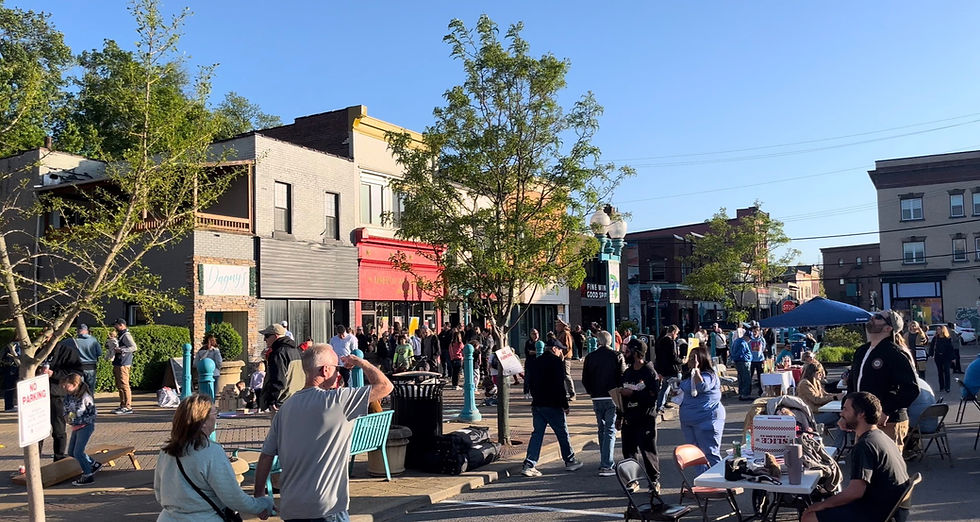Pittsburgh’s Farm Sanctuaries Give Animals Second Chances
- Kathleen Ganster
- Oct 31, 2025
- 5 min read
For Karen Phillips, it all started with a small potbellied pig. When the veterinarian was working at a local shelter, a tiny pig came in, but the facility was not equipped to deal with the farm animal. So, Phillips took him home. And that was the beginning of Hope Haven, a nonprofit farm animal sanctuary.
“Hope Haven is Pittsburgh’s farm sanctuary, right here in the North Hills. Farm sanctuaries are rare in the U.S., and we’re proud that our city—known for being compassionate and animal-loving—has one to celebrate and support,” she said. “We provide lifelong refuge to rescued farm animals while creating joyful connections between people and animals. Through education and community programs, we inspire compassion and celebrate Pittsburgh as an animal-loving city.”
While other shelters and sanctuaries rescue common household pets such as dogs, cats, and rabbits, Hope Haven rescues pigs, goats, alpacas, turkeys, ducks, emus, and other farm animals. “We collaborate with humane agents, police, and other rescue organizations on abuse and neglect cases,” Phillips said.
It is important, of course, for the sanctuary to provide a safe place for these animals, but Hope Haven is more. They provide education and opportunities, according to Phillips. “We give people a chance to meet and bond with farm animals as individuals, not commodities—an opportunity most people never get,” she said. These opportunities include private and public farm visits and other events May through November. The Sewickley farm, home to more than 125 animals, is a location easily accessible to anyone in the Greater Pittsburgh area.

Like many nonprofits, Hope Haven depends on volunteers and donations. “We need volunteers in different capacities. Of course, many people want to work with the animals, but we need assistance in marketing and other areas. We do ask for a commitment of at least twice a month,” Phillips said.
Another way to assist Hope Haven is to simply follow them on social media outlets and visit the farm. “It is an easy, free way to help us—the more people who follow and like us on social media, the more people know about us,” she said. “Every bit of support helps us continue to give farm animals safe and loving homes.”

Kindred Spirits Farm Ranch, located in Darlington, also serves farm animals—both large and small—who are part of cruelty and abandonment cases, according to Lisa Marie Sopko, who founded the sanctuary with her husband, John. The couple purchased their 20-acre farm to house their own two horses but soon found themselves taking care of other rescued animals. After a friend encouraged Sopko to start a nonprofit, they founded Kindred Spirits.
Sopko works alongside law enforcement and emergency services from not only several counties but several states, where there are cases of cruelty, neglect, or abandonment. “Many organizations do not have the equipment or experience needed to secure and transport these animals, which respond and react quite differently than dogs and cats,” she said.
Kindred Spirits provides housing, medical services, and socialization for the animals throughout the legal process, which typically lasts up to two years. Currently, they house more than 200 animals. They then provide permanent sanctuary if the courts find in favor of the animals.
Education is vital when it comes to their animals. “We are important because animal welfare includes all animals, not just domestic animals. We also expose people to farm animals and promote compassion and empathy toward them,” she explained. “We encourage more humane treatment of all animals and allow people to connect with animals on a personal level, and why they should recognize farm animals as individuals.”
Sopko also works with law students at Duquesne University who assist with the legal aspects of the nonprofit, pre-vet students at the University of Pittsburgh who receive hands-on experience at the farm, and with the Allegheny County District Attorney’s Office to increase awareness.
Kindred Spirits also faces the ongoing necessity of raising funds and awareness and seeking volunteers. “We must work so much harder to raise money than organizations who help traditional pets, and our funding avenues are so much more limited. Our yearly costs for hay, feed, bedding, and veterinary care teeter around $175,000,” she said. “The second and very important need is manpower. We are an all-volunteer organization, and we require a staff of at least four people each day who are willing to do heavy work like cleaning stalls—in all weather, every day, including holidays. We also need people who are passionate about public outreach, education, and fundraising.”

It is Sopko’s dream to have the farm completely wheelchair accessible, especially because John was left paralyzed after a car accident shortly after they purchased the farm. They also hope to open an on-site veterinary office.
To help raise funds, they host at least one event per month along with private tours. Their annual plant-based dinner is slated for Nov. 22, and the Thanksgiving Dinner for the animals is on Nov. 28.
Jessica Poutous and Jesse Blake purchased their Saxonburg farm with the goal of rescuing animals, but at the time, they didn’t know that they would be creating a nonprofit, J & J Farms Animal Sanctuary Inc. “We bought the farm in 2014, and our first rescues were some chickens and ducks that were not adopted at a local farm store. We knew nothing about them at the time,” Poutous laughed. Poutous learned as she went, with her brother, an avian veterinarian, serving as a mentor. Soon, they found themselves taking in more animals as word of mouth spread.
“We take in residents on a case-by-case basis, focusing on those who are injured, abandoned, abused, and/or special needs. We're the only sanctuary in Western PA who can accommodate special needs poultry. We've built wheelchairs for disabled chickens, developed special runs to accommodate blind ducks, helped geese with broken legs walk again, and more. They're animals who had nowhere else to turn, hence the reason we're a sanctuary and not a rescue,” Poutous said.
In 2021 they became an official nonprofit to help them with their efforts to raise funding and awareness. More than 100 chickens, ducks, geese, draft horses, and even bees are housed at the sanctuary. Poutous is a certified beekeeper and sells honey from their rescued hives as a fundraiser.
Like the other sanctuaries, funding and volunteering are always an issue. They welcome those who wish to volunteer by not only helping with the animals but with tasks such as marketing, fundraising, and events. “We need people willing to help us attend events to help us get the word out about what we do,” she said.
They host at least one fundraising event each month, with their popular holiday open house and photo sessions slated for Dec. 6. “This is a family-friendly event and a great time to just come visit the farm, get your photo taken, and have fun,” Poutous said.












































Comments